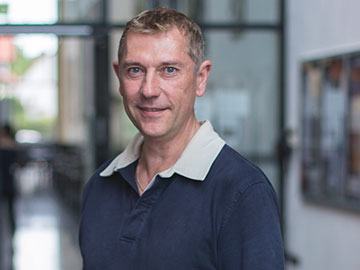Ulrich H. P. Fischer
In this installment of Senior Member Insights, OPN talks with Ulrich H. P. Fischer, a professor of optical communications systems at the Harz University of Applied Sciences, Germany, and CEO of the HarzOptics GmbH. Fischer has his diploma and Ph.D. in physics from the Free University Berlin, Germany. In 2005, he achieved his lecture qualification in photonic packaging technology from the Technical University Dresden, Germany. He has been working on research positions in the Heinrich-Hertz-Institute Berlin in Germany. He has performed several international research projects with European partners from France, the Netherlands, Norway and the UK.
Fischer has edited several books about photonic packaging techniques, holds several patents and has published more than 200 papers in international scientific journals. His research activity has always been related to photonic packaging and optical communications technology.
What first interested you in pursuing science?
Even as a child, I was fascinated by physics and the structure of matter. I found quantum mechanics and Albert Einstein's work on the theory of relativity particularly interesting. This motivated me to study physics and continue to work scientifically. It was my deepest wish to become a scientist.
What aspect of your current work do you find the most interesting or exciting?
My current research focuses on the development of photonic packaging and the further development of optical networks. In particular, the development of bandwidths and transmission options in fiber optic technology has progressed very quickly, and new possibilities have also been found for the application in the field to increase the bandwidth very significantly, so that this has increased exponentially by a factor of 1,000 within the last two years.
Collaboration with colleagues in companies and universities enriches our daily work and allows new ideas to emerge through open exchange, which always fascinates and motivates me.
“Collaboration with colleagues in companies and universities enriches our daily work and allows new ideas to emerge through open exchange, which always fascinates and motivates me.”
—Ulrich H. P. Fischer
What tips for successful networking do you have for early-career professionals?
My recommendation for young scientists is to actively network and exchange ideas at conferences and workshops. This creates a basis for later work and cooperation opportunities between universities and research companies. Actively approach young and older experienced colleagues and join in the discussion. Particularly at the evening events, you can easily approach others and network.
What professional resources do you rely on to stay active and engaged with your field?
In order to maintain my network and get to know new colleagues, I like to take advantage of workshops and conferences with evening events. Active participation in committees with organizations such as Optica or IEEE also provides a very good opportunity to maintain and deepen networking
What skills do you think are most important for someone interested in a career like yours?
From my point of view, two prerequisites are particularly important in order to position yourself well and develop in the scientific world: First, there must be the inner desire to work scientifically and to always deal creatively with new ideas. Another point is a very high level of commitment to this work and bringing out as many good publications as possible.
What’s the best career decision you’ve ever made, and why?
The best decision in my scientific career was to move away from physics and fundamentals and enter applied research at a Fraunhofer Institute. I was able to get more involved in the applied side of research, which I was much more interested in than basic research
What advice do you have for young scientists who are discouraged about their current work or career path?
“If you experience a major standstill in your career path, you should examine yourself and ask yourself whether the current type of research and its direction really corresponds to your talents.”
—Ulrich H. P. Fischer
If you experience a major standstill in your career path, you should examine yourself and ask yourself whether the current type of research and its direction really corresponds to your talents. Should I do more applied research in a company or at a research institute? Or is basic research at a university more suitable for me?
What is one piece of advice that you wish you were given as a student/early in your career?
My advice would be to ask the following: Which career path do you want to take? Do you want to work more at the university and possibly become a professor later, or do you want to go into applied research in a company or a research institute?
Both paths are fundamentally different and also have very different options with your inner orientation. The university path in particular is very long, and it takes a long time to finally achieve a professorship. The chances of advancement are usually better in a company. The opportunities to earn good money are significantly better in this case.
What habits do you frequently rely on that help you to succeed?
For me, it is important to be able to switch off from work. I like to use my sport and ride a motorcycle for this purpose.
If you weren’t in the sciences, what would be your dream career?
If I wasn't working in the sciences, I would like to work as a doctor. However, I can also imagine wanting to work as an editor and tester for a motorcycle publishing company.

